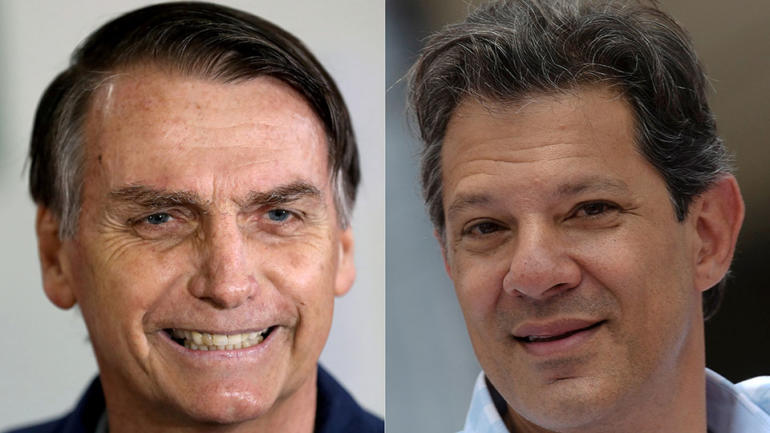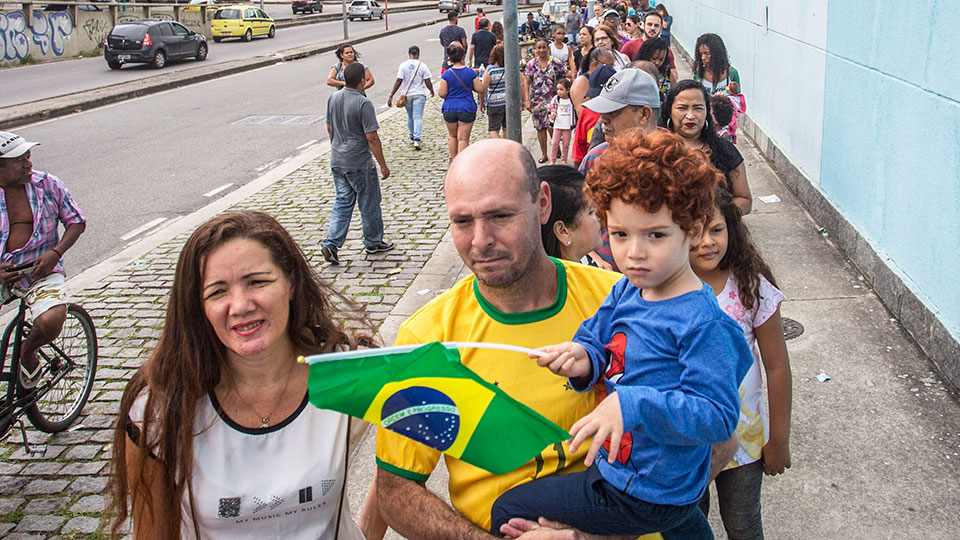Brazilians gave an outright victory to a brash-speaking former army captain who has promised to restore “traditional values,” jail crooked politicians and give police a freer hand to shoot drug traffickers.
CGTN’s Lucrecia Franco reports.
But with far-right congressman Jair Bolsonaro getting 46 percent of the vote Sunday, short of the 50-plus percent he needed, voters also signaled they were not quite ready to make a final decision. On Oct. 28, Bolsonaro will face second-place finisher Fernando Haddad in a runoff vote. Haddad, the Workers’ Party standard-bearer who was appointed by jailed ex-President Luiz Inacio da Silva, got 29 percent in the first round, and polls have predicted a close race in the runoff.
Bolsonaro was expected to come out in front on Sunday, but he far outperformed predictions, blazing past competitors with more financing, the institutional backing of traditional parties and much more free air time on television. The candidate from the tiny Social and Liberal Party made savvy use of Twitter and Facebook to spread his message that only he could end the corruption, crime and economic malaise that has seized Brazil in recent years — and bring back the good old days and traditional values.
“This is a victory for honest people who want the best for Brazil,” said Bianca Santos, a 40-year-old psychologist who gathered outside a hotel where Bolsonaro was watching the returns. “I believe he is the only one with a serious plan to end crime.”
For voters, Bolsonaro and Haddad represent starkly different visions for the future. Bolsonaro has promised to slash spending, privatize as much as possible in a country long heavy on state control and be a check on social movements that have gained much ground in recent years.
Meanwhile, true to the Workers’ Party’s leftist roots, Haddad has promised to fight long-standing inequalities, scrap a major labor reform passed last year and invest more in education.
Where Brazil’s next leader takes the economy, the largest in Latin America, will have a large impact on surrounding countries that are trading partners with Brazil. The next leader will also have an influence on Venezuela, both diplomatically and practically, as thousands of Venezuelans have crossed Brazil’s northern border.
Bolsonaro has promised a harder line on Venezuela and other leftist regimes and closer ties with the United States. It’s not clear what Bolsonaro would do to further isolate Venezuelan President Nicolas Maduro, but he once suggested creating camps for the Venezuelans who have fled the country’s economic collapse.
But much of his campaign focused on domestic issues. Bolsonaro has painted a nation in collapse, where drug traffickers and politicians steal with equal impunity, and moral rot has set in. He has advocated loosening gun ownership laws so individuals can fight off criminals, encouraging police to shoot more crooks and restoring “traditional” Brazilian values — though some take issue with his definition of those values in light of his approving allusions to the country’s 1964-1985 dictatorship and his derisive comments about women, blacks and gay people.
Haddad, a former education minister, has also spent much time arguing that da Silva, his mentor, was unfairly jailed — a strategy aimed at attracting voters who still feel strong affection for da Silva despite a corruption conviction. Workers’ Party stalwarts are still fuming about the 2016 impeachment and removal of office of President Dilma Rousseff, da Silva’s predecessor.
Story by The Associated Press
Léo Siqueira on Brazil’s right-wing vote surge
For more on Brazil’s election, the contenders and the implications, CGTN’s Asieh Namdar spoke with Léo Siqueira, a writer and analyst from Sao Paulo. He’s also the director for Latin America with the Advance Interactive Media Group.
 CGTN America
CGTN America A combination of file photos shows Jair Bolsonaro, far-right lawmaker and presidential candidate of the Social Liberal Party (PSL), casts his vote in Rio de Janeiro, Brazil October 7, 2018 and Fernando Haddad, presidential candidate of Brazil’s leftist Workers Party (PT), attends a rally in Belo Horizonte, Brazil October 5, 2018. REUTERS/Ricardo Moraes/Washington Alves
A combination of file photos shows Jair Bolsonaro, far-right lawmaker and presidential candidate of the Social Liberal Party (PSL), casts his vote in Rio de Janeiro, Brazil October 7, 2018 and Fernando Haddad, presidential candidate of Brazil’s leftist Workers Party (PT), attends a rally in Belo Horizonte, Brazil October 5, 2018. REUTERS/Ricardo Moraes/Washington Alves

